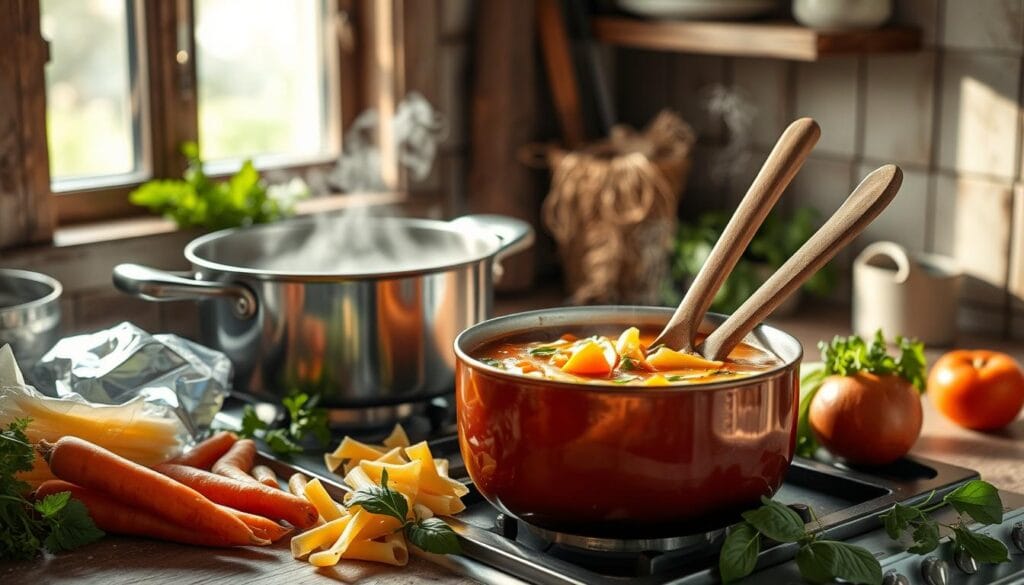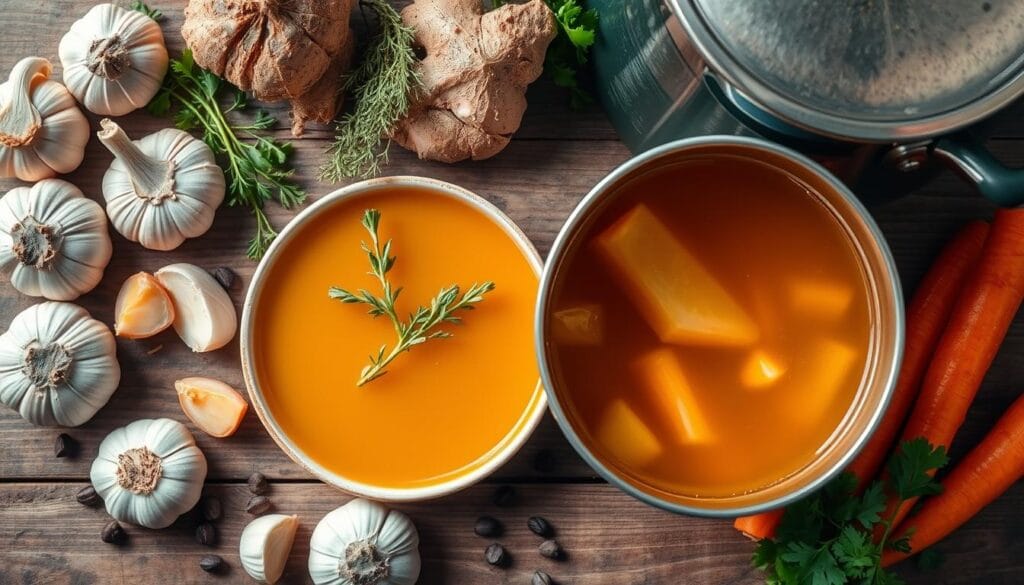As autumn’s chill arrives, nothing soothes like a warm bowl of Italian penicillin soup. Known as “pastina soup,” it’s a beloved remedy in Italian homes. It offers comfort and nourishment when you need it most.
Pastina, the tiny pasta stars, hold a special place in Italian kitchens. Italian grandmothers have shared its healing secrets for generations. This soup is a warm hug, perfect for chilly evenings or when you’re feeling sick.
Table of Contents
Key Takeaways
- Pastina soup, or “Italian penicillin,” is a comforting and nourishing dish featuring tiny pasta in a flavorful broth.
- This traditional Italian recipe is known for its healing properties and is a staple in many households.
- The soup is perfect for chilly days or when you’re feeling under the weather, providing a cozy and restorative dining experience.
- Pastina, the miniature pasta stars, have long been a beloved ingredient in Italian cuisine, often used in soups and other comforting dishes.
- This recipe can be easily customized to suit your taste and dietary preferences, making it a versatile and satisfying option.
Understanding Pastina: The Tiny Pasta with Big Comfort
Pastina is a small, beloved pasta in Italian cooking. It comes in shapes like acini di pepe balls and stelline stars. It’s also found as orzo, which looks like rice. Pastina is great at soaking up flavors, making it a key part of Italian soups.
Different Types of Pastina Shapes
- Acini di pepe: Tiny, round balls of pasta
- Stelline: Small, star-shaped pasta
- Orzo: Rice-shaped, small pasta
Why It’s Called “Little Pasta” in Italian
The name “pastina” means “little pasta” in Italian. Its small size helps it blend well into soups. It’s also easy to digest, making it perfect for kids and those feeling sick.
Traditional Role in Italian Cuisine
Pastina is a big deal in Italian cooking, especially in soups. Its small size and ability to soak up flavors make it a favorite. It’s used in many Italian dishes, from simple soups to more complex ones. Pastina is a true Italian culinary treasure.
“Pastina is the ultimate comfort food – a tiny pasta that soothes the soul and nourishes the body.”
Health Benefits and Healing Properties of Pastina Soup
Pastina soup is known as “Italian penicillin” for its soothing effects. It’s made with warm broth, easy-to-digest pasta, and veggies. This dish is loved for its comfort and support when you’re sick.
A 2000 study found that chicken soup can help with colds and flu. The soup’s warmth and hydration, along with pastina’s nutrients, make it great for recovery. A small serving of pastina has protein and fiber, helping your body heal.
People call it “Italian penicillin” because it’s so good at making you feel better. Stories from many show how it comforts and supports during illness. It brings people together with its comforting taste.
The traditional recipe of Italian penicillin soup has evolved. But its core remains the same. It’s still a top pick for feeling better and finding comfort.
Feeling sick or just want something warm? Pastina soup is a great choice. It hydrates, gives essential nutrients, and warms you up. It helps ease symptoms and boosts your health.
| Ingredient | Quantity |
|---|---|
| Organic Chicken or Veggie Broth | 4 cups |
| Water | 6 cups |
| Servings Yielded | 8 |
Looking for a soothing remedy or a comforting meal? Pastina soup is both. Its warmth and nourishment make it a delicious choice. Try it and feel its restorative effects yourself.
“Pastina soup has been a go-to remedy for me whenever I’m feeling under the weather. The warm broth and comforting pasta always provide a sense of relief and restoration.”
Essential Ingredients for Authentic Pastina Soup
Making a real pastina soup needs the right ingredients. At its core, the soup has tiny pasta shapes that make it special. These shapes, along with a flavorful broth and veggies, make the soup a true Italian classic.
Choosing the Right Pasta Type
The pasta in pastina soup is key. Traditional pastina, or “little pasta,” are tiny stars that cook fast. They mix well with the broth. You can also use other small pasta shapes like acini de pepe or orzo for a similar feel.
Broth Selection and Preparation
The broth in pastina soup is very important. Use a good chicken or vegetable broth, homemade or from a trusted brand. It should be seasoned well and simmered to bring out the best flavors.
Key Vegetables and Aromatics
Onions, carrots, and celery are the heart of pastina soup. They, along with garlic, add depth to the broth. You can also add Parmesan rind, fresh herbs, or chicken for more flavor and nutrition.
| Ingredient | Quantity |
|---|---|
| Pastina or small pasta | 1 cup |
| Chicken or vegetable broth | 12 cups |
| Yellow onion, diced | 1 large |
| Garlic, minced | 3 cloves |
| Carrots, sliced | 3 large |
| Celery, diced | 3 stalks |
| Parmesan rind (optional) | 1 piece |
| Fresh parsley, chopped | 1/2 cup |
| Grated Parmesan cheese | 1/2 cup |
With these ingredients, you can make a delicious penicillin soup recipe or any homemade soup recipes with the taste of pastina soup.
Italian Penicillin Soup Recipe: Step-by-Step Guide
Craving a comforting soup to fight off winter blues? Try Italian Penicillin Soup with pastina. This recipe is easy and will have you enjoying a homemade bowl in no time.
Start by sautéing diced onions, carrots, and celery in olive oil and butter. Onions add sweetness, carrots boost beta-carotene, and celery adds crunch.
Then, add your broth choice – chicken or vegetable. Let the veggies simmer until tender. Blend some soup for a smooth texture.
- Add pastina to the broth and cook for 5-7 minutes.
- For protein, add shredded cooked chicken.
- Let the soup rest for 20 minutes to meld flavors and soak pastina.
Serve hot with Parmesan cheese and parsley. The pastina, broth, and veggies will make you feel better fast.
“This soup is like a big, warm hug in a bowl. It’s the perfect remedy for chasing away the winter blues.”
This italian penicillin soup recipe is great for colds or comfort meals. Add your favorite veggies, herbs, or spices. Enjoy making pastina and let this soup nourish you.

The Perfect Broth Base: Creating Rich Flavors
When making a penicillin soup or a traditional Italian soup, the broth is key. It’s the base that brings all the flavors together. To make a great broth, use a few important techniques. These will make your pastina soup taste amazing.
Using Parmesan Rind for Enhanced Taste
Adding a Parmesan rind to your broth is a game-changer. As it cooks, it adds a deep umami flavor. This makes the broth rich and velvety, perfect for the pastina pasta. Just put a Parmesan rind in the pot and let it add its savory taste.
Vegetable Preparation Techniques
- Dice the vegetables, such as onions, carrots, and celery, into uniform pieces for even cooking.
- Sauté the aromatic vegetables like onions and garlic first to develop their flavors before adding them to the broth.
- Consider using a blend of vegetables, including the classic Italian trio of onions, carrots, and celery, to create a complex, layered broth.
By focusing on your broth’s quality, your pastina soup will be full of delicious flavors. Use these techniques and top-notch ingredients. Then, you’ll have a fantastic penicillin soup or traditional Italian soup.

Cooking Tips and Common Mistakes to Avoid
When making homemade pastina soup, it’s important to avoid a few common mistakes. First, don’t overcook the tiny pasta. It can quickly become mushy and lose its texture. Start with a smaller amount of pastina than you think you’ll need. The pasta expands a lot while cooking.
Seasoning is crucial in how to make pastina. Adjust the flavors slowly and taste as you go. This ensures the perfect balance of saltiness, aroma, and sweetness. For a creamier soup, blend some of the vegetables and broth. But be careful with hot liquids. Let the mixture cool a bit and vent the blender lid to avoid accidents.
- Avoid overcooking the pastina to prevent it from becoming mushy
- Start with less pasta than you think you’ll need, as it expands significantly
- Adjust seasoning gradually and taste as you go for the perfect flavor profile
- Blend a portion of the vegetables and broth for a smoother, creamier texture
- Be cautious when blending hot liquids, allowing them to cool slightly and venting the blender lid
By following these homemade soup recipes tips, you’ll make a delicious and comforting pastina soup. It will warm your soul and please your taste buds.
Customizing Your Pastina Soup
Pastina soup is a comforting dish that you can make your own. It’s great for a hearty meal or a light, plant-based option. There are many ways to customize this classic Italian soup.
Vegetarian and Vegan Variations
For a meatless version, use vegetable broth instead of chicken broth. This keeps the soup’s rich flavor while fitting vegetarian and vegan diets. You can also add plant-based proteins like beans, lentils, or tofu for extra nutrition and texture.
Adding Protein Options
For a more filling soup, add shredded rotisserie chicken, diced chicken breast, or small meatballs. These proteins make the soup a complete meal. Try different pastina shapes like stelline, acini di pepe, or orzo to make it your own.
Customizing your pastina soup is all about using quality ingredients and adjusting the seasoning. With a bit of creativity, you can make this classic dish fit your dietary needs and taste perfectly.
Storage and Reheating Guidelines
Enjoying your homemade pastina soup is a treat. You can store and reheat it easily. Just follow a few simple steps to keep it tasting great.
Store your soup in an airtight container in the fridge for 3-4 days. It’s perfect for meal prep or a quick, healthy meal. When reheating, add a bit more broth to fix the pasta’s texture. This way, your soup stays delicious.
Freeze leftovers for up to 4 months if you can’t eat them soon. Freezing is great for keeping your freezer stocked with comforting meals. Thaw it in the fridge overnight and then reheat as usual.
FAQ
What is pastina soup?
What is pastina?
Why is pastina soup called “Italian penicillin”?
What are the key ingredients for authentic pastina soup?
How do you make pastina soup?
What’s the secret to a flavorful pastina soup broth?
What are some tips for cooking pastina soup?
How can I customize pastina soup?
How do I store and reheat leftover pastina soup?
Leave us a comment if you like the recipe
There are no reviews yet. Be the first one to write one.
